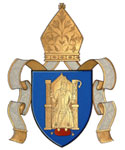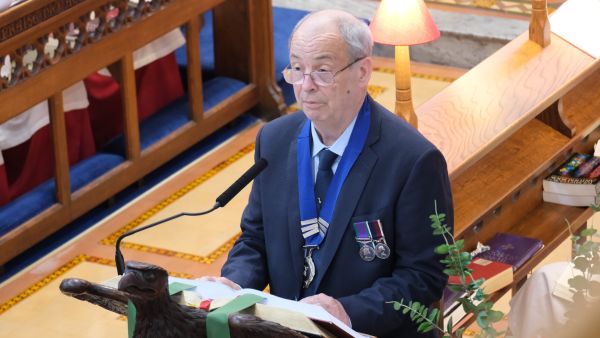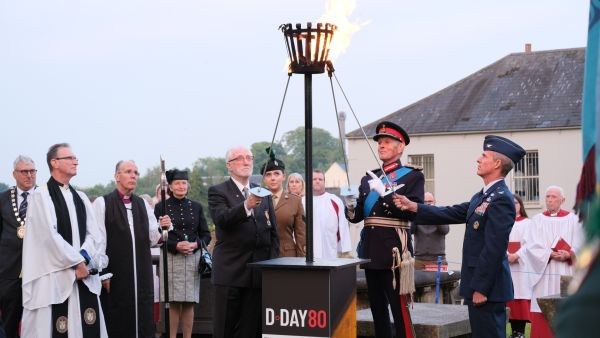 |
 |
News
Community gathers to commemorate D Day 80 years on

Clergy who took part in the service around the beacon at St. Macartin's Cathedral.
A large number of people including civic leaders and representatives of the Armed Forces and Regimental Associations gathered in St. Macartin’s Cathedral, Enniskillen on Thursday evening, 6 June for the D Day Commemoration Service at which the Royal Air Forces Association Fermanagh Branch participated.
His Majesty’s Lord Lieutenant for county Fermanagh, Viscount Brookeborough KG KStJ and Viscountess Brookeborough also attended. The new Chairman of Fermanagh and Omagh District Council, Councillor John McClaughry was also present.
The service was conducted by Dean Kenneth Hall assisted by the Curate, the Revd. Edwin Aiken.
The preacher was the Bishop of Clogher, the Right Revd Dr. Ian Ellis.
In his sermon, Bishop Ellis referred to the scale of the Normandy Landings in terms of seaborne vessels and the assault from the air from the Allied nations and the human cost of lives lost as a result of the battles that ensued.
He said; “Today we commemorate the 80th anniversary of the Normandy Landings on 6 June 1944 and join with others in a series of major commemorations and events across the UK and in France. It was the largest seaborne invasion in history. Coordination between Allied nations led to a force from 13 countries approaching Normandy in a 5000-vessel armada.

Ray Hall Royal Air Forces Association reading a lesson.
“In the early hours of D-Day, paratroopers and glider-borne troops landed behind German lines. Then a ground force of more than 130,000 troops came ashore on five beaches on the Normandy coast, with the first waves facing fierce opposition. By the end of D-Day there had been 10,000 allied casualties. Yet this was only the beginning. The ensuing Battle of Normandy was to last into August and cost tens of thousands of lives as it defeated and pushed back the occupying German forces. It was a decisive day and paved the way for the liberation of much of northwest Europe.
“All of us this evening can feel a deep sense of indebtedness in recalling the sacrifices of those who served 80 years ago. Remembrance is an opportunity to pause and reflect, giving thanks and honouring the memory of those who gave their lives to defend our democratic freedoms. Remembering in this way does not glorify conflict, instead, it unites us as we commemorate lives lost in the service of many nations.
“We join in Remembrance to never forget. We remember the service of military personnel who showed courage and sacrifice, particularly those from these shores, and in the context of this service, we think of the members of the RAF who served on this day 80 years ago. We also remember the thousands of US soldiers who trained in Co. Fermanagh during WW2 in preparation for the Normandy Landings.
“I was interested to read recently of the contribution of a Fermanagh clergyman who was among the Allied troops who stormed the beaches of Normandy. Flying in on the evening of June 6, Revd James McMurray-Taylor acted as padre to hundreds of soldiers, many of whom would lose their lives in the hours and days to come. He worked in dangerous situations to conduct many burial services for both Allied and German dead soldiers.
“After the war, Revd McMurray-Taylor was appointed Rector of Derrybrusk, and in 1957 he was appointed to Castle Archdale and Killadeas parishes. He died in 2001 and is buried at the graveyard at Castle Archdale, and still has family living in the area.
“A visit to the beaches of Normandy serves to increase a sense of awe and wonder at the enormity of the battle, the difficulty of the task, the strength of the enemy opposing the allied personnel trying to land and the unbelievable courage and tenacity of soldiers, sailors and airmen that day and succeeding days.
“Some years ago, Heather and I brought our children for a visit to Normandy during a holiday in France. Standing on a calm beautiful beach, you just can’t imagine it to have been the scene of such fierce fighting on that terrible day. We were amazed at how on they landed in such numbers and managed to overcome such resistance to scramble up cliffs in the face of the pounding of enemy guns whose emplacements are still to be seen.

Viscount Brookeborough reading a lesson.
“We also visited a war graves cemetery near Omaha beach where many US personnel are buried. We were gripped by the peaceful and silent witness to the dead in the immaculately kept war graves not far from the shore. The endless rows of crosses and the occasional star of David. The names, the young ages, the date of death of thousands on the first day of the landings, and the occasional no name; ‘known only to God’. It is a very humbling and moving experience to visit these memorials and there are hundreds of similar graveyards dotted all over France, Belgium and other countries of Europe. It brings home the scale of the sacrifice of those young men and women. Some who never made it beyond the beaches or surrounding towns and villages they liberated.
“It speaks of overwhelming generosity and goodness. Generous and dutiful giving of life for us generations later, their friends; ‘greater love has no man than this that he lay down his life for his friends’.
“I read an account this week of a D Day navy veteran who was lucky enough to survive, now 100 years of age; he reflects on the landings on Juno beach on 6th June 1944 as so many were killed or drowned on the first assault from the landing craft. He said ‘I visit the Cenotaph every year because I feel I have a duty to do so, to remember who they were, how brave they were and how they died. The country has a duty to remember them too’. How right he is and how fitting we fulfil that duty today.
“A second part of what we are doing this evening is to light a beacon; as part of a wider UK activity of beacon lighting expressing our sharing in the note of celebration of this 80th anniversary. It is a shared act of unity in our remembrance and thanksgiving.
“The heroism of those who landed on the Normandy beaches, represented a beacon of light for the world during a particularly dark period of war. It is therefore fitting that towns and villages throughout the United Kingdom, and those along the shorelines of Utah, Omaha, Gold, Juno and Sword beaches in Normandy, should light beacons tonight. As the PM has said we do this in 'tribute to the light of peace that they brought out from the misery of darkness during that dreadful campaign... Protecting the peace, they fought for is the greatest way we can honour those who fell’.
“From a Christian perspective our service too lights a beacon of hope across the nations and we underscore the hope we have in God for the fulfilment of that OT prophecy ‘that they shall beat their swords into ploughshares and their spears into pruning hooks; nations shall not lift up sword against nation, neither shall they learn war anymore’ Isaiah 2: 4.
“Our television news reminds us every day that we live in very troubled times across the world. There are nations at war, and grinding conflicts, we see war mongering and aggressive political posturing. The world is certainly not at peace with itself. On a world scale too, mankind seems to be on a collision course with nature itself, with the impact of global warming, rising sea levels, flooding and drought.

Clergy leading the prayers.
“We need to hear again in that beautiful prophecy of Isaiah, how the world could be at ease with itself, and strive to make peace a reality. Our service today not only is one of thankfulness for those who 80 years ago by their service and sacrifice overcame the enemy, we also pray for a time when such offering of life to overcome aggression and violence will not be necessary.
“We pray in the name of the prince of peace, who by his death on the cross, overcame evil and death, and who opened a way for mankind to find eternal peace with God. We pray for all peacekeepers and peacemakers, those bringing humanitarian aid to the needy, and we pray for those serving in hospitals, and broken communities helping to heal the wounded and bring the basics of life to the displaced and despairing.
“We earnestly pray that the nations ‘shall not learn war anymore’.
“So, as we thank Almighty God for the gifts of courage, unstinting service and sacrifice of military personnel on that D- Day of the 6th of June 1944, we couple it with a heartfelt plea, that mankind might find peaceful ways of facing the future and seek the ways of the one by whose stripes we are healed and by whose death we are saved,” he added.
At the beginning of the service, Viscount Brookeborough read a message from King Charles; “On 6 June 1944, following an intense period of preparation uniting military planning and civilian industrial ingenuity, nearly 160,000 young men landed under enemy fire on the beaches of Normandy. Each of these courageous sailers, soldiers and aviators risked his life so that others might live in freedom and in peace. Many were never to return. Eighty years later, it remains our solemn duty to continue to honour the outstanding gallantry, service and sacrifice of those who took part in that perilous mission. We do so with the most profound admiration and respect, and with everlasting gratitude.”
Dean Hall, in his introduction to the service, said they met to give thanks to Almighty God and commemorate the 80th anniversary.
“We especially remember those who came from Fermanagh who were involved in D Day either through land, sea and air and the thousands of US troops who were based in this area in 1944 training for the invasion of Normandy.”
The lessons were read by Ray Hall, Chairman of the Fermanagh Branch, Royal Air Force Association and Viscount Brookeborough.
The prayers were led by the church representatives; Revd Edwin Aiken, Curate at St. Macartin’s Cathdral; Padre Trevor Homfray-Cooper, Royal Dragoon Guards; Revd Steve Kennedy, Presbyterian Church; Revd Lorna Dreaning, Methodist Church and Monsignor Peter O’Reilly, Roman Catholic Church.
#4#
The hymns were; “All people that on earth do dwell,” “Make me a channel of your peace,” “God is our strength and refuge,” “O Ruler of the earth and sky” and “I, Lord of sea and sky.” The organist was Mr. Glenn Moore.
During the service, the County Fermanagh Branch Royal Air Force Association dedicated new cords for their standard to mark their 75th anniversary.
Introducing an Act of Remembrance, Air Commodore Stu Stirrat explained that the cords had been donated by the Eames family in memory of Bill Eames, a former President of the County Fermanagh Branch. Before joining the Royal Air Force in WW2, Bill attended Enniskillen Model School, Portora Royal School and St Macartin’s Cathedral and his name is recorded on the Cathedral’s WW2 memorial. On D Day, Flight Lieutenant Eames, from Enniskillen, piloted a plane towing a glider into Normandy.
At the end of the service, several members of the Regimental Pipes and Drums of the Royal Dragoon Guards played military marches to the congregation including “Fare Thee Well Inniskilling.”
Following the service, a beacon was lit in the grounds of the Cathedral, attended by representatives of the US and Polish Consuls in Northern Ireland.

Dean Kenneth Hall dedicating the cords for the RAF Association standard.

The beacon is lit.

The Bishop of Clogher delivering the sermon.